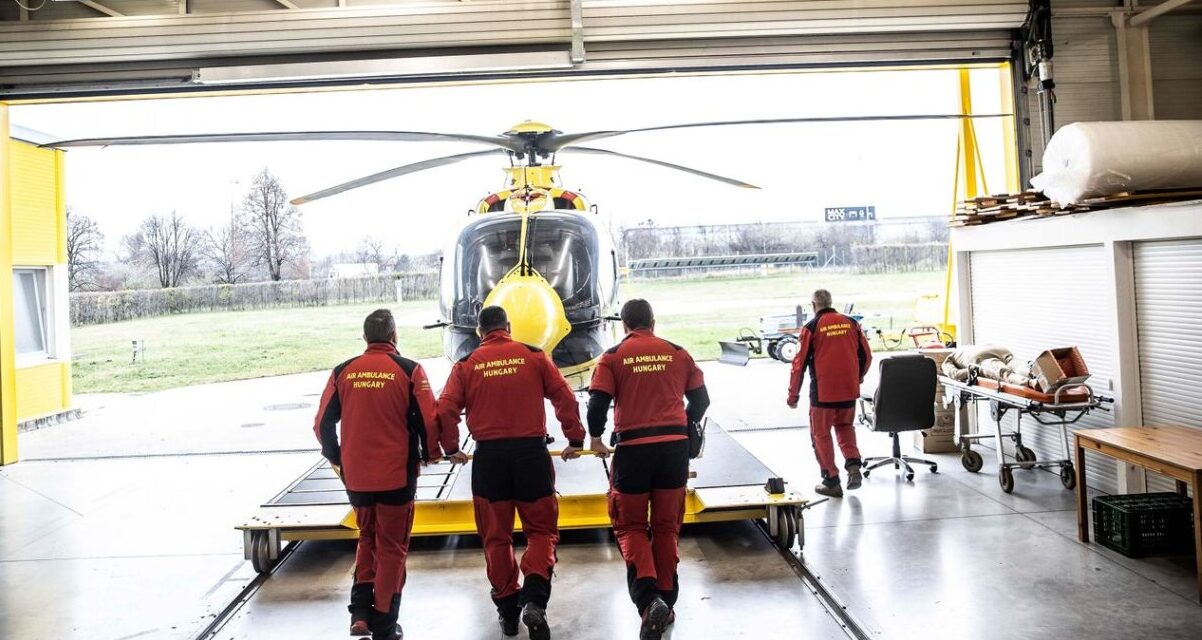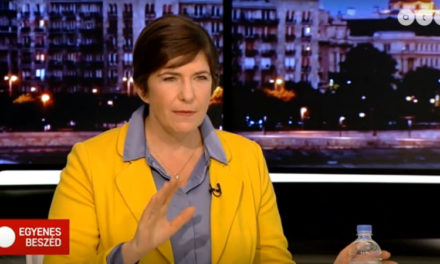According to what traditions are the holidays celebrated among firefighters, ambulances and the police? What are the most common cases during the Christmas period and how can we avoid them? Of course, what do they say at home that Christmas is not spent with their loved ones, but in the barracks and on the base? People in uniform told the Hungarian Nation.
"There is no such thing as a holiday for firefighters, there are two types of days for them: service day and rest day. Firefighters work 24/48, which means that one duty day is followed by two rest days. They start work at six in the morning, which lasts until six the next morning. If the service day falls on Christmas, then they work on Christmas, because you always have to save lives and put out fires," said Dániel Mukics, the spokesperson of the BM National Disaster Management Directorate General.
Dániel Mukics noted that even when there is no alarm, the firefighters are not idle in the barracks either: they hold field exercises in schools, hospitals, practice in the yard of the barracks, play sports, train themselves, and between two alarms there is also time to celebrate together.
"There are places where colleagues give gifts to each other, prepare a Christmas menu, decorate a tree and eat cakes brought from home together. This is not at all unusual for us, as we develop much closer relationships here than at other workplaces. Here, two colleagues not only work together, but also entrust their lives to the other, since firefighters depend on each other in the event of a fire. Many fire stations also organize charity events during the holidays, collecting gifts and non-perishable food for those in need. Others visit hospitals as firefighter Santa Clauses or help Santa climb through the hospital's upstairs window with a forklift," said the lieutenant colonel.
"And what does the family say about this? They are used to the fact that Christmas Eve or Christmas does not always start on December 24. A day before or after, depending on the service. But after a serious intervention, it's appropriate to call home that everything is fine," revealed Dániel Mukics, who also noted that in order to avoid having to spend Christmas with the firefighters this year, it's okay to follow some basic rules.
He pointed out that fifty house fires occur every year due to Advent wreaths, but fires caused by Christmas trees would also end up on the podium.
"Many people put up a Christmas tree at the beginning of December, which is why these pines are already cut down in mid-November, which then dry out very quickly in a heated building. And dried pine burns so well that if it catches fire at one point, it only takes a few seconds and the whole tree will be on fire and ignite everything around it," he pointed out, at the same time advising that the drying of the pine can be delayed somewhat if, after purchase, store in a bucket of water, or choose a pine base in which the pine stands in water. Thus, its moisture content is higher and it is more difficult to ignite.
"Whether we have real or artificial pine, the basic rule is to place the Christmas tree at least one and a half meters away from heating devices or any heat source. Do not decorate with candles or sparklers. Conventional light bulbs can get very hot, so we should put LED light bulbs on them instead. But even this is turned off at night," he listed.
Regarding string lights, strings of lights, and Christmas decorations, he said that under no circumstances should we use faulty products bought at the market or in the subway. If the wire of the string of lights or the extension is longer than what we need, you still have to lay it all out.
"If you put it under voltage when it's coiled up, it will get so hot that it will catch fire," he noted, but also cautioned against the use of sparklers. He explained: these are very dangerous, because they burn at a temperature between 1000 and 1600 degrees Celsius, the hot sparks can fly far away and can very easily ignite their surroundings.
The firefighter said about the holiday menu: in the rush, we sometimes forget about the food, and it spends more time in the oven than the recipe suggests.
"To prevent a fire, set the timer on your phone for when the food is ready or when you need to stir it. If we were clumsy and the food caught fire on the stove, don't put it out with water, because the fire will only get bigger. If, for example, burning oil were to be extinguished with water, the water would properly explode the burning oil, and it would ignite everything around it. Instead, put a lid on it and turn off the stove. And if the food catches fire in the oven, simply turn off the oven and wait for the fire to go out. If we don't want to set fire to the kitchen, let's keep the environment around the stove in order," he explained.
Dániel Mukics finally touched on the fact that one of the best tools for prevention is the smoke detector, which beeps loudly as soon as a fire starts, so that we are immediately aware of the fire.
"In the cases where there were smoke detectors, there were no tragedies, no injuries, and not even a major fire. A smoke detector might not be the most creative Christmas gift, but it sure is the most practical. Let's buy a smoke detector for Christmas for our elderly loved ones who live alone. After unwrapping the gift, all we have to do is install it on the ceiling in the middle of the room. But the best thing is to buy a powder fire extinguisher worth a few thousand forints, which can be safely used even for electrical fires," he suggested.
"Overeating, overdrinking, i.e. diseases of the digestive system, are on the podium during the holiday season, but the number of household accidents also multiplies during these days. It starts with the pine wood carving, then decorating the house and even making the holiday menu, the burn or cut injuries are the ones that alert us," said the emergency doctor Ákos Jászkuti, who works in both ground and air rescue.
The doctor explains that in the winter season, the air ambulance shifts are timed to coincide with sunrise and sunset, so they can go on missions from 8 in the morning until 3 in the afternoon.
In such cases, the day starts according to the already well-established routine, next to the morning coffee, the essential life-saving tools are brought out: a venous and airway insurance kit, syringes, probes, sewing tools, refrigerated medicines, masks, oxygen bottles, then the stretcher and finally fresh blood into a rescue helicopter. The doctor also puts on a belt bag, in which there are clamps and scissors, but there is always room for a brown teddy bear.
While the helicopter is being packed inside, its technical condition is checked outside, even before the start of the shift. According to Ákos Jászkuti, it is important not only for rescue workers to make an inventory, but also at home and to buy some medicines, such as pain and fever relievers, but also to replace the medicines we take for chronic diseases as soon as possible. As for families with small children, it is also worth filling the cupboard with well-proven remedies.
When asked what their duties are during the winter or during the holidays, the paramedic revealed that traffic accidents are typical, and falls from heights are also common.
"However, there is no such difference in rescue on the ground, in winter, people suffering from chronic respiratory diseases may require more interventions. Unfortunately, cases of hypothermia are common in this area, when a patient in critical condition is transported to the hospital from a completely unheated apartment. But secondary cooling is also not rare, which means that the patient is in a life-threatening condition after consuming a large amount of alcohol or drugs," he indicated, then continued, and during the Christmas period they also encounter cases that can be said to be typical.
Ákos Jászkuti noted that fatigue at the end of the year is not typical in this profession, and they do not feel that the last weeks of the year are more difficult either, since they are "wired" completely differently due to the twenty-four-hour duty.
"While other workplaces are typically busy during the last period of the year, at our place it is completely unpredictable, how and how each day goes by, how stressful a case is or how many alarms are received," he explained, adding that holidays are always special for organizations that are on constant alert. .
"This profession is not easy, we encounter many tragedies and human destinies that affect us as well. At this time of the year, we also thank our families, who accept and at the same time support that we have chosen a profession that is about helping and where we always have to go," said Ákos Jászkuti.
"It's the same for policemen with holidays, because every day is the same for them, that is, on duty. "Whoever becomes a policeman chooses a profession and is aware that a uniformed person must work on weekends and holidays as well," said Police Lieutenant Colonel György Kálmán Pregun, Division II of the Emergency Police. the head of his deployment department, who immediately added that, of course, when organizing the service, individual requests and family circumstances are taken into account, so if it is possible and the duties of the service permit, parents with small children are tried to be left without on Christmas Eve, while young colleagues - who are still they like to party - they prefer New Year's Eve. Of course, the most important thing is that they can complete the task given in the instructions.
The police lieutenant-colonel reminds us that the Emergency Police serves and protects the entire country: from national football matches to the biggest events, they provide almost all important events.
The tasks are therefore very diverse and at the same time varied, but it is not always possible to plan in advance for the long term.
Thus, it happens that one day a unit is still working in Budapest, but the next day it is at the other end of the country, but despite the multifaceted work, they do not forget to pay attention to each other.
"The mood for the holiday is not only helped by the Christmas trees set up in the classes, but also by the desire to do something for others. Every year, at the end of the year, we organize a fundraiser for our colleagues who, unfortunately, need support due to their family situation or health condition," reported the lieutenant colonel about one of their initiatives, which has become a tradition by now, and which was launched by the commander.
Cover image: Helicopter ambulances
Source: Magyar Nemzet/Árpád Kurucz













